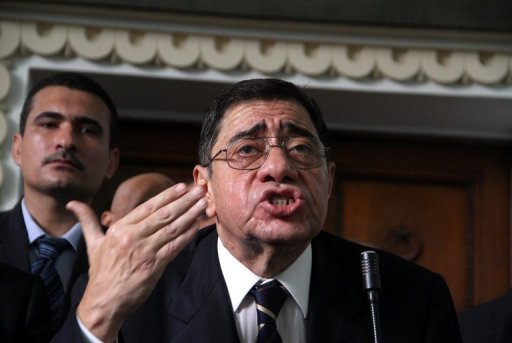TUNIS: Tunisian interior minister Rafik Belhaj Kacem was sacked Wendesday as police and protesters clashed in the center of the capital Wednesday, bringing unrest to the government’s doorstep after nearly a month of violent protests that pose the most serious challenge to the autocratic president’s two decades of iron-fisted rule.
Prime Minister Mohamed Ghannouchi said that most prisoners arrested during the riots are being freed. He said official Ahmed Friaa would replace Kacem.
Police fired tear gas at hundreds of protesters at a main intersection, driving them to disperse into adjoining streets. Stores in the area were shuttered.
It was not immediately clear whether there were any injuries or arrests.
Two army vehicles were posted at the intersection, which is right by the French Embassy.
The fighting erupted hours after the interior minister was fired, a move that intensified a sense of uncertainty and questions about what’s next for autocratic President Zine El Abidine Ben Ali — questions that have never been openly posed during his time in power.
The protests over Tunisia’s soaring unemployment and corruption erupted after a young man tried to kill himself. They spread as social networks like Facebook spread word of the unrest despite tight control of the media.
Police have repeatedly shot at demonstrators setting fire to buildings and stoning police. The government says 23 people have died but unions and witnesses put the toll at 46 or higher.
The upheaval has ravaged the nation’s reputation as a stable and moderate Muslim nation and highlighted its inability to provide opportunities for its young.
It began in the center of the country, far from the Mediterranean beaches popular with European tourists, but riots were reported late Tuesday in the Ettadhamoun neighborhood five kilometers west of Tunis before spreading to the center of town.
"We are worried, in general, about the unrest and the instability, and what seems to be the underlying concerns of the people who are protesting," US Secretary of State Hillary Clinton said in an interview in Dubai with Al Arabiya television, according to a transcript provided by the State Department.
On Wednesday, Ghannouchi announced the creation of two inquiry commissions to probe "excesses committed during the troubles" and "the question of corruption and faults committed by certain officials," the statement said.
The president, who has previously announced major cabinet changes, made no public appearance Wednesday.
In a statement carried by the state news agency TAP, Ghannouchi did not give figures on how many people would be freed, but said the government would not be releasing protesters whose guilt has been proven.
Kacem kept his job in a government reshuffle last month, but pressure on Tunisia’s leadership has mounted as the protests took an especially violent turn.
"It seems to be a combination of economic and political demonstrations, and the government’s reaction, which has been unfortunately leading to the deaths of some of the protestors. So we are not taking sides in it, we just hope there can be a peaceful resolution of it," Clinton said.
The prime minister’s reference to excesses may have referred to the handling of rioters in certain towns. The majority of the dead were counted in three days of unrest, from Saturday to Monday, in the central town of Kasserine.
The statement also said the two houses of parliament would be called to an extraordinary session Thursday for an "open debate" on measures announced Monday by Ben Ali that include a promise to create 300,000 jobs over two years, particularly meant to benefit university graduates.
The 74-year-old Ben Ali, a former interior minister himself, grabbed power 23 years ago in a bloodless coup. Human rights groups in Tunisia and abroad have long criticized the lack of freedoms.
According to Ghannouchi, the president has stressed his wish to place at the forefront "dialogue and peaceful freedom of expression and association and for all parties to be involved in treating the questions of the nation."


